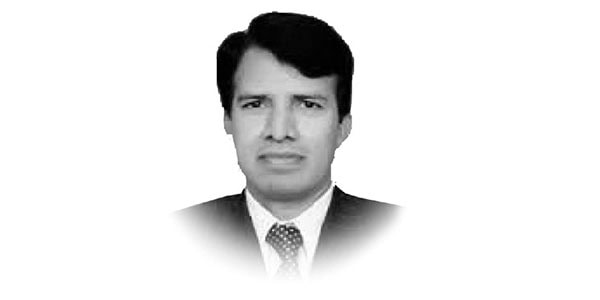Social media campaigning against national institutions
WITH the fall of the PTI Government at Federal level, there has increased the social media campaigning against the national institutions of Pakistan.
Two highly prestigious institutions; the Judiciary and the Military are the main focus of this media campaigning.
This is an extreme act by the political forces against the national institutions since the outcome of such ill-conceived social media and electronic media campaigning would damage the state apparatus and the institutions.
The change of the government at federal level took place through a democratic process which is given in the Constitution of Pakistan.
The previous government of PTI tried to violate the constitutional provisions of democratic process which the superior judiciary decided as per the ruling.
This historical decision consequently annoyed the political leadership of the PTI who dared to speak against the Supreme Court of Pakistan and its honourable judges.
This act of the party speaks of a specific mind-set where everything was fine once decisions were in their favour.
But, the same judges became controversial and biased, once a decision went against them. This is an autocratic mind-set which goes against the spirit of politics and democracy.
They should have courage to accept the correction of their wrong and unconstitutional act of dissolution of the National Assembly and announcement of ill-conceived new elections.
Apart from the judiciary, the Military and its top leadership are also under social media attacks and campaigning.
This is an extreme act by political forces and their vested workers who run these networks to defame the Military and premium intelligence agency of Pakistan.
The Federal Investigation Agency (FIA) has arrested a “mastermind” and at least six other members of his network for launching a Twitter trend against the Pakistan Army, in the wake of recent political developments in the country.
There is a sudden rise in the campaign of politicization of the Pakistani Military at the level of various political forces, several non-state actors and social groups.
These groups make use of mainstream as well as the social media for their disinformation campaigns to defame and politicize Pak Army and its premium intelligence agency in particular.
It appears that this politicization of the Pakistani Military is part of a larger agenda which may prove very dangerous against this most organized, highly professional and most popular and loved institution of Pakistan.
This campaign of Politicization of the Pakistani Military has two dimensions – domestic and external.
Domestically, the politicization of Pak Army aims at defamation of this institution, since it is the most popular institution of Pakistan, loved by masses ever since Pakistan came into being.
In fact, Pak Army draws its strength from the masses of Pakistan. This intimate bond and devoted connection is the real area of concern for the rival power (s) of Pakistan.
The foes of Pakistan therefore have chosen to target this intimate relationship in phase one of their larger anti-Pakistan agenda.
During this phase, the planners would like to create differences between masses and Pak Army through an indirect strategy of defamation while negatively agitating the sentiments of masses and creating abhorrence against the institution of Military.
Indeed, no external power can succeed in overpowering Pakistan in the presence of a very strong and highly professional military which enjoys the unswerving, resilient and dedicated support from the people of Pakistan.
The enemies of Pakistan had tried it many a time, last being the global war against terrorism.
The intimacy and strong association between Pak Army and the masses enabled the former (Army) to combat, defeat and dig-out the roots of this internationally sponsored terrorism against state and society of Pakistan.
Seeing the intensity of this internationally sponsored terrorism against Pakistan, it was assumed that, Pakistan would meet the fate of Iraq, Libya and Syria.
Nevertheless, the brave defence forces of Pakistan crushed these terrorists and their backers and abettors.
This annoyed the planners and compelled them to diversify their strategies against Pakistan.
While debating the external dimension of targeting Pakistan and its military, it appears that after having failed in their strategies and efforts of weakening the Pakistani Military through direct approach, the international spying networks have adopted an indirect strategy to weaken the Pakistani military.
They assume that, after weakening the Military, there will be no force to resist the international and regional forces to ruin Pakistan, the way it happened with Iraq and Libya.
Defamation and politicization of Pakistani Military is an indirect approach to devastate Pakistan in a future scenario.
The enemies of Pakistan are formulating strategies to defeat us from within. This means; creating fault lines, causing split, defamation and humiliation, hatching plots and conspiracies, politicization of key institutions and causing hatred against institutions of national security.
There is a need to create a sense of awareness against the global and regional plots which aim to weaken Pakistan through an indirect approach of targeting its national institutions.
Politicization and defamation of the military would further lead towards creation of a sense of demoralization among the fighting outfits.
It is to be noted that, Pakistani military is among the top few militaries of the world from the perspective of professionalism, bravery and dedication.
The theme of this article is; let’s not allow defamation and politicization of national institutions of Pakistan.
It is hard to imagine the challenges and hardships the military men face while confronting the enemies of various categories; conventional and unconventional, kinetic and non-kinetic and above all the threats of hybrid warfare.
Let’s be united and harmonized at the national level so that the rival forces dare not to exploit any vulnerability of Pakistan.
— The writer is Professor of Politics and IR at International Islamic University, Islamabad.










